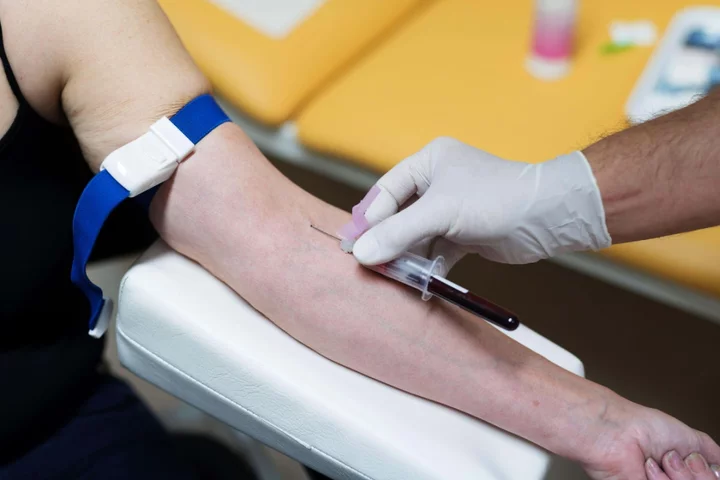
Experts resurrect parasite after 46,000 years in Siberian permafrost
Scientists have resurrected a parasite which has been dormant in the frozen permafrost of Siberia for 46,000 years. The microscopic creatures were first uncovered as part of a remarkable discovery back in 2018. At the time, researchers led by Anastasia Shatilovich found two of the worms in sub-zero temperatures in the soil. At first, it was previously thought that the creatures could stay in their slumber for just 40 years. However, it was later revealed that they could stay inactive for tens of thousands of years. Sign up to our free Indy100 weekly newsletter The creatures tend to shut down their systems when they are in unfavourable conditions. This means they won’t move or reproduce, and their metabolism stops. Carbon analysis has revealed that the worms – also known as nematodes – came from a prehistoric era. The developments could change the way experts approach bringing back other extinct species, too. During an analysis, the research team discovered the worms were Panagrolaimus kolymaensis - a species that was previously thought to be extinct. The scientists wrote in their paper: “Previously, we had shown that nematodes from the Siberian permafrost with morphologies consistent with the genera Panagrolaimus and Plectus could be reanimated thousands of years after they had been frozen. “Several viable nematode individuals were found in two of the more than 300 studied samples of permafrost deposits spanning different ages and genesis.” It’s not the only thing that scientists have recovered from permafrost, either. It was announced earlier this year that scientists are busy working on reviving 'zombie viruses’ that have been lying dormant for tens of thousands of years in Arctic conditions, and while it sounds absolutely terrifying, it could be important when it comes to protecting us all in the future. Have your say in our news democracy. Click the upvote icon at the top of the page to help raise this article through the indy100 rankings.
2023-07-28 19:23

Algeria media guide
An overview of the media in Algeria, as well as links to broadcasters and newspapers.
2023-07-28 19:17

'I had the most insane eyebrows': Benny Safdie adopted unkempt apperance for Oppenheimer
Benny Safdie grew bushy eyebrows for his role as Hungarian-American physicist Edward Teller in 'Oppenheimer'.
2023-07-28 17:59

Experts reveal the most unhygienic things in your kitchen – and how to get them clean
It’s likely there are countless things in your kitchen which look clean, but actually, they’re filthy. Could your dishcloths be making you sick? When was the last time you washed your tea towels? And do we really need to bleach the sink more than once a month? We asked an expert to find out. Knobs, door handles, and buttons The buttons and dials on your kitchen appliances could be a germ-fest. “People often neglect to clean these areas of the kitchen,” says Danielle Mason, a cleaning content creator – or ‘cleanfluencer’ – who creates tutorials and videos on TikTok and Instagram. “Most of the time, they don’t think it is important, but as you’re commonly handling raw meat and food, it’s extremely important to keep these areas clean, due to cross-contamination. “Always sanitise with a cloth – I like to do this with Zoflora, as it leaves a great smell afterwards, and kills bacteria from dirty fingers.” Cloths If what you clean with isn’t clean, chances are, your kitchen isn’t either. “I always leave my cloth to soak in bleach before going to bed every night,” says Mason. “This enables a new start in the morning with no bacteria. Also, make sure you’re replacing the cloths – I would suggest a new one every two weeks, whilst still bleaching every night. And make sure you’re not using this cloth on anything other than the kitchen, as you do not want to cross-contaminate.” Sponges Mason stresses sponges are unhygienic, as they’re constantly damp and can carry E. coli. “People tend not to use sponges, as they carry so many more germs, and even putting them in the microwave will not kill all of them. Avoid a sponge where possible.” Dish towels Dish towels and tea towels may not be changed anywhere near often enough. “You should have one for every day of the week, as they carry so many bacteria and germs, which get spread across the kitchen. If you’re drying pots and pans, and then wiping down your surfaces, it’s not good,” she says. Chopping boards Chopping boards – particularly wooden ones – could be a haven for bacteria. “You should have a different colour for different types of food, one for meat, fruit, and other foods,” advises Mason. “The best way to clean them is in a dishwasher, as it’s good to get rid of all the germs due to the very high heat. If you don’t like the dishwasher, then boil the kettle water and leave the chopping boards to soak in it. I use a steam cleaner on mine, as it kills 99.9% bacteria and there are no chemicals.” It is best to avoid wooden chopping boards altogether, as these cleaning methods may damage them. Kitchen sink “This is a massive breeder of bacteria and grime; a distinct microbiome is found in sinks. “The plumbing area found beneath sinks revealed microbial communities dominated by a group of bacteria called Proteobacteria. This phylum includes pathogens such as Salmonella and E. coli, which can cause serious disease,” Mason shares. “I’ve always been taught never to wash my hands in the sink, and to never throw dirty water down the sink. You wash your cups and plates in the sink and prepare food, so it should always be kept clean, and nothing from outside the kitchen should cross-contaminate that. For example, never wash your floors and put dirty water in your kitchen sink, always throw it down the toilet.” How do you possibly clean the inside of your sink and drains? “Baking soda and vinegar is the best way to clean your sink out, or bleach, but you must be careful with bleach, as it can stay in the bottom of your sink, depending on the material it’s made of. I clean my sink out every day.” Pipes and cupboards around your sink could be leading you to have a rodent problem. “You can prevent mice and rodents from entering the kitchen by covering any small crevices or cracks. It is also important to repair leaks as soon as they happen, as they can come through the pipes,” she says. Fridges “Deep clean [your fridge] every two months. A normal cleaning – the wiping of shelves – should be done every other day with soapy water. For any bad smells, use baking soda, which will absorb the smell from the fridge,” Mason continues. “The fridge is a breeding ground for salmonella, E. Coli and other bacteria.” Bins Where you throw your waste away could be a breeding ground for germs. “Make sure you keep [outdoor] rubbish bins away from your house, and make sure you empty your bin as soon as it’s full,” advises Mason. “I personally do not keep a bin in the kitchen, I use a bag and I take that out by the end of the day, but if you are using a bin, make sure you bleach it with hot kettle water, to keep it smelling fresh.” Read More This is why you keep waking up at 4am – and what you can do about it TV chef James Martin reveals cancer diagnosis in apology over ‘bullying’ allegations Bursts of activity that make you huff and puff ‘linked to reduced cancer risk’ Charity boss speaks out over ‘traumatic’ encounter with royal aide Ukraine war’s heaviest fight rages in east - follow live
2023-07-28 17:48

Ferrer Allocates, on Average, More Than 40% of its Profits to Social and Environmental Projects for the Third Consecutive Year
BARCELONA, Spain--(BUSINESS WIRE)--Jul 28, 2023--
2023-07-28 17:16

Study uncovers what nap times reveal about young children’s brain development
Babies and toddlers who nap a lot may have smaller vocabularies and poorer memory and thinking skills, research suggests. Parents and guardians all over the world worry about their children getting either too little or too much sleep. But a new study reveals that some children are better at consolidating information during sleep, so they nap less frequently. Those with fewer words and poorer cognitive skills need to nap more frequently, the researchers found. Young children will naturally nap for as long as they need and they should be allowed to do just that Dr Teodora Gliga, University of East Anglia However, the findings suggest that reducing naps for these children will not improve brain development, and that they should be allowed to nap as frequently and for as long as they need. Lead researcher Dr Teodora Gliga, from the University of East Anglia (UEA), said: “There is a lot of parental anxiety around sleep. “Parents worry that their kids don’t nap as much as expected for their age – or nap too frequently and for too long. “But our research shows that how frequently a child naps reflects their individual cognitive need. “Some are more efficient at consolidating information during sleep, so they nap less frequently. “Children with smaller vocabularies or a lower score in a measure of executive function nap more frequently.” She added: “Young children will naturally nap for as long as they need and they should be allowed to do just that.” The research team studied 463 infants aged between eight months and three years during lockdown in 2020. What we found is that the structure of daytime sleep is an indicator of cognitive development Dr Teodora Gliga, University of East Anglia Parents were asked about their children’s sleep patterns, their ability to focus on a task, keep information in their memory, and the number of words that they understood and could say. They also asked parents about their socioeconomic status – including their postcode, income, and education – and about the amount of screen time and outdoor activities their child engaged in. Dr Gliga said: “Lockdown gave us an opportunity to study children’s intrinsic sleep needs because when children are in childcare, they rarely nap as much as they need to. “What we found is that the structure of daytime sleep is an indicator of cognitive development. “Infants with more frequent but shorter naps than expected for their age had smaller vocabularies, and worse cognitive function. “We also found that this negative association between vocabulary and frequency of naps was stronger in older children.” She added that although the majority of parents reported that lockdown did not impact their children’s sleep, parents from lower socioeconomic backgrounds were more likely to report a worsening in sleep. Caregivers should use a child’s mental age and not chronological age to ascertain a child’s sleep needs Dr Teodora Gliga, University of East Anglia “Screen time increased during lockdown and outdoor activities decreased but these did not explain differences in children’s sleep,” Dr Gliga said. She continued: “Our findings suggest that children have different sleep needs – some children may drop naps earlier because they don’t need them anymore. “Others may still need to nap past three years of age. “In the UK, preschools enrolling three to five-year-olds have no provisions for napping. “Caregivers should use a child’s mental age and not chronological age to ascertain a child’s sleep needs.” The study, published in the JCPP Advances journal, was led by UEA in collaboration with researchers at the University of Oxford, Oxford Brookes University, the University of Leeds and the University of Warwick. It was funded by the Economic and Social Research Council (ESRC). Read More Charity boss speaks out over ‘traumatic’ encounter with royal aide Ukraine war’s heaviest fight rages in east - follow live Bursts of activity that make you huff and puff ‘linked to reduced cancer risk’ New outfits in Highland dress collection help museum tell the story of modern tartan 5 expert-approved ways to stop your hair colour fading this summer
2023-07-28 16:27

Bursts of activity that make you huff and puff ‘linked to reduced cancer risk’
Short bursts of daily activity that make you huff and puff – such as playing high-energy games with children – could help reduce the risk of cancer, research suggests. According to the study, a total of just four-and-a-half minutes of vigorous activity – done in bursts of around one minute each – during daily tasks could reduce the overall risk of cancer by 18 per cent, and the risk of some cancers linked to physical activity by up to 32 per cent. Other activities could include vigorous housework, carrying heavy shopping around the supermarket, or bursts of power walking. Lead author Professor Emmanuel Stamatakis, of the Charles Perkins Centre, University of Sydney, Australia, said: “We know the majority of middle-aged people don’t regularly exercise, which puts them at increased cancer risk, but it’s only through the advent of wearable technology like activity trackers that we are able to look at the impact of short bursts of incidental physical activity done as part of daily living. “It’s quite remarkable to see that upping the intensity of daily tasks for as little as four to five minutes a day, done in short bursts of around one minute each, is linked to an overall reduction in cancer risk by up to 18 per cent, and up to 32 per cent for cancer types linked to physical activity.” Cancer types linked to physical activity are those where not exercising increases the risk of developing the disease. The cancers associated with physical activity included liver, lung, kidney, gastric cardia (a type of stomach cancer), endometrial, myeloid leukaemia, myeloma, colorectal, head and neck, bladder, breast and esophageal adenocarcinoma (cancer of the oesophagus). Published in Jama Oncology, the study used data from wearable devices to track the daily activity of more than 22,000 people who do not exercise. Researchers then followed the group’s clinical health records for close to seven years to monitor for cancer. They found that as few as four to five minutes of vigorous intermittent lifestyle physical activity (Vilpa) was associated with a substantially lower cancer risk compared with those who undertook no Vilpa. Vilpa was coined by researchers at the University of Sydney’s Charles Perkins Centre to describe the very short bursts of activity – around one minute each – we do with gusto each day. Vilpa is a bit like applying the principles of high-intensity interval training (HIIT) to your everyday life Professor Emmanuel Stamatakis, University of Sydney Prof Stamatakis said: “Vilpa is a bit like applying the principles of high-intensity interval training (HIIT) to your everyday life.” He added that adults who do not exercise are at increased risk of developing certain cancers such as breast, endometrial or colon. But, until recently, experts were not able to measure the impact of less structured forms of vigorous physical activity. In the study sample of 22,398 people with an average age of 62 who did not exercise in their leisure time, the researchers found 2,356 new cases of cancer (1,084 in physical activity-related cancer) over an average follow-up of 6.7 years. They found that a minimum of around 3.5 minutes of daily Vilpa was associated with up to an 18% reduction in cancer incidence, compared with no Vilpa, while 4.5 minutes of daily Vilpa was associated with up to a 32% reduction in the risk of cancers linked to physical activity. The researchers used data from the UK Biobank Accelerometry Sub Study and only included people who reported no leisure time exercise and no regular recreational walks. Read More TV chef James Martin reveals cancer diagnosis in apology over ‘bullying’ allegations Men have a problem – and it won’t be solved by either Andrew Tate or Caitlin Moran Husband fired from family business after wife roleplayed with reborn dolls
2023-07-28 16:19

This is why you keep waking up at 4am – and what you can do about it
Ever find yourself awake, staring into space at four in the morning? Is it just a bad habit, or is there something more sinister going on? And why does it always seem to happen at 4am? “We start to experience less deep sleep after around four to five hours,” says Lisa Artis, deputy CEO of The Sleep Charity, who have partnered with Simba mattresses. And once we’re in that lighter sleep faze, we wake much more easily. If you generally fall asleep around 11pm – which is a very common bedtime, 4am wake-ups are more likely. And there are many factors leading to these inconvenient stirrings. Hormones “Sleep is guided by our internal clock or circadian rhythm. One of the most significant and well-known circadian rhythms is the sleep-wake cycle,” Artis continues. “Sleep is regulated by the levels of two hormones: melatonin and cortisol, which follow a regular 24-hour pattern. Melatonin assists you in dozing off, while cortisol helps get you up, and keeps you awake,” she explains. Keeping an eye on your hormones is important in preventing those late-night wake-ups. “Engage in calming activities before bedtime, such as reading, listening to soothing music, or practising relaxation techniques, like deep breathing or meditation,” says Dr Mariyam H. Malik, GP at Pall Mall Medical. Equally, pop your phone down for a bit. “Blue light from electronic devices can suppress melatonin production. Try to avoid screens for at least two hours before bedtime, or use blue light filters. It is best to charge them in a separate room overnight,” Malik adds. Diet Caffeine, heavy meals, alcohol, sugar, and a lack of magnesium or B vitamins could lead you to have a more disturbed night’s sleep, according to Malik. Sugar and carbohydrates may have a particular impact. “A diet high in sugar and refined carbohydrates can cause blood sugar fluctuations, leading to wakefulness during the night,” she says. “It’s unlikely you’ll feel hungry in the middle of the night if your blood sugar dips,” notes Artis, “but to reduce ungodly hour awakenings, trial alternatives for your last meal or snack of the evening. Instead of carb or sweet-based snacks, opt for protein-packed and magnesium-rich foods, like hard boiled eggs, cottage cheese, pumpkin seeds, spinach, dark chocolate, cashews, chicken thighs or turkey.” Protein can take the edge off your night-time hunger, she says, while magnesium is known to support sleep. Needing a wee Do you wake up needing to wee at the same time every night? “Try not to drink excessive amounts of fluids before bedtime,” advises Malik. “It’s important to stay hydrated, but try not to drink anything for around two hours before your usual bedtime. Go to the toilet before you go to bed to empty your bladder. ” Age and life stage “Sleep tends to become more disrupted as people get older,” Malik explains. “Sleep patterns change with age, and various factors can contribute to sleep disturbances in older adults. Some common reasons for sleep disruption in the elderly include changes in your circadian rhythm, decreased melatonin production, medical conditions or medications, and potential sleep disorders.” It can also affect women during the perimenopause. “The reproductive hormones – oestrogen and progesterone – are entwined with the sleep and relaxation hormones, melatonin and serotonin,” says Artis. “When oestrogen begins to fall before and during menopause, it can create a disturbance in the sleep-promoting hormone melatonin, meaning it can’t properly balance out cortisol. When this happens, the ability to fall and stay asleep is affected.” Recurring hot flushes, night sweats, dry skin, and low libido can signal waning oestrogen. Artis advises incorporating foods with high levels of phytoestrogens into your diet throughout the day to help with this. “Phytoestrogens imitate the natural estrogens found in your body. As a consequence, they can bind to your body’s oestrogen receptors and produce similar effects.” Try lentils, kidney beans, chickpeas, tofu, edamame, spinach, cauliflower and broccoli. Worrying Stress is not good for sleep. One study by Bupa even found that 32 million Brits wake up worrying about their health at precisely 4:05 am. The report, which surveyed 4,000 British adults, revealed that more than three-fifths of us wake up in the middle of the night. If you are finding yourself awake at all hours worrying, or waking up with stressful dreams, there are a few things that may help. “Keep a journal by your bedside and write down your worries before going to bed. This practice can help get your concerns out of your mind and onto paper, making it easier to let go of them temporarily,” says Malik. You may also want to “engage in mindfulness or meditation exercises before bedtime. Mindfulness can help you focus on the present moment, reducing anxiety about the past or the future.”
2023-07-28 15:55

Ariana Greenblatt starstruck by Barbie actor Michael Cera
Teen actress Ariana Greenblatt was totally starstruck when her hero Michael Cera was cast alongside her in the Barbie movie
2023-07-28 15:19

Hepatitis B and C could cause ‘significantly higher cancer risk’ than smoking daily pack of cigarettes
People living with hepatitis B (HBV) and hepatitis C (HCV) could be just as likely or more likely to develop cancer than someone smoking a pack of cigarettes a day, new research suggests. According to the Center for Disease Analysis (CDA) Foundation, people infected with hepatitis B and C viruses “have a similar or significantly higher risk of developing cancer than someone who actively smokes one pack of cigarettes per day”, and therefore HBC and HBC should be “considered as cancer causing infections and international guidelines should be reconsidered accordingly”. Hepatitis is the term used to describe inflammation of the liver, according to the NHS. Hepatitis B is spread in the blood of an infected person – it can be spread from infected women to their babies, or through unprotected sex and injecting drugs – and hepatitis C is usually spread through blood-to-blood contact with an infected person. The NHS says HCV is most commonly spread in the UK through sharing needles used to inject drugs. The foundation found that HBV and HCV viruses are highly oncogenic. Oncogenes are mutated genes which can lead to cancers in multiple organs and sites. Homie Razavi, managing director at CDA Foundation said: “Hepatitis B and C infections are silent epidemics. These viral infections are cancer causing but since infected individuals don’t show any symptoms until it is too late, most infections go unnoticed. “It is important for all of us to recognise the high risk of cancer associated with hepatitis B and C infections and get patients linked to care. Treatment can reduce the risk of cancer by 85% or more.” As part of a call on World Hepatitis Day 2023 (July 28), the World Hepatitis Alliance (WHA) has launched a campaign called ‘We’re not waiting’ with its global network of 323 members in over 100 countries, in order speed up the fight against the disease, which claims a life every 30 seconds. In a new survey, the WHA found that 42% of people around the world are unaware that viral hepatitis is one of the leading causes of liver cancer. Nearly three-quarters (74%) of those surveyed said knowing that hepatitis causes liver cancer means they are more likely to get tested, whilst 82% would get vaccinated. In total, over 350 million people have been diagnosed with either hepatitis B or C around the world, which results in more than 1.1 million deaths every year. And by 2024, deaths caused by this disease could surpass mortality from malaria, HIV, and tuberculosis combined, according to the WHA. “Every year, more than a million lives are lost to hepatitis,” said Danjuma Adda, president of the WHA. “The theme of World Hepatitis Day 2023 is ‘We’re not waiting’. It’s a call to accelerate elimination efforts of viral hepatitis now and the urgent need for testing and treatment for the real people who need it. “Individuals and communities around the world are making change happen in their own lives and in [the] world around them. We celebrate them, while demanding more action. We’re not waiting for change – we’re fighting to make it happen.” Read More Charity boss speaks out over ‘traumatic’ encounter with royal aide Ukraine war’s heaviest fight rages in east - follow live
2023-07-28 14:56

Sanofi Lifts Guidance on Dupixent, Covid Vaccine Sales
Sanofi raised its forecast for the year as the French drugmaker gains new patients for blockbuster drug Dupixent
2023-07-28 13:52

What to stream this weekend: Post Malone, 'Beanie Bubble,' 'This Fool,' Rolling Stones and 'Heels'
This week’s new entertainment releases include a new album from Post Malone, a movie starring Zach Galifianakis about the creation of the cute collectable Beanie Babies and a video game for the whole family with Disney Illusion Island
2023-07-28 12:16
